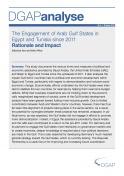Abstract: This study documents the various forms and measures of political and economic assistance provided by Saudi Arabia, the United Arab Emirates, and Qatar to Egypt and Tunisia since 2011. It also analyzes the impact those donor countries had on political and economic development within Egypt and Tunisia, particularly with regard to democratization and inclusive socioeconomic change. Economically, efforts undertaken by the Gulf states were intended to stabilize the two countries, for example by helping them overcome budget deficits. While their business investments have not yet trickled down to the economically marginalized segments of the Egyptian and Tunisian population, some of the Gulf-funded development projects have been geared toward fueling more inclusive growth. Due to limited coordination between Arab and Western donor countries, however, there has thus far been little alignment of projects taking place in the same sectors. As a result, the potential for synergies between these projects has remained untapped.
In political terms, as was expected, the Gulf states did not engage in efforts to promote more democratization. Indeed, in Egypt the assistance provided by Saudi Arabia and the UAE even contributed to a return to the pre-2011 order.
With regard to the Deauville Partnership, the Gulf states have refrained from subsuming their efforts under the partnership, at least in their communication with Egypt and Tunisia. This undermines the Deauville Partnership’s reputation as a mechanism for assisting Egypt and Tunisia. Nevertheless, many stakeholders see it as a useful forum for improving and increasing future coordination. Governance issues do not yet receive the attention they need within the forum to promote further democratization, however.
For Germany and its partners to engage the Gulf states more intensively on governance matters and to create incentives, deeper knowledge is required about how political decisions are made the Gulf. This is also essential for developing Germany’s much-needed general strategy toward the Gulf states, which is currently lacking.
Click here for a pdf of the 85-page study.
Table of Contents
The Engagement of Arab Gulf States in Egypt and Tunisia since 2011: Rationale and Impact
by Sebastian Sons and Inken Wiese, with a preface by Dina Fakoussa
Chapter One
Shifts and Deeper Changes in the Gulf States’ Foreign Policies since 2011
1. General Remarks
2. Saudi Arabia’s Foreign Policy
3. The Foreign Policy of the United Arab Emirates
4. Qatar’s Foreign Policy
Chapter Two
Egypt after 2011: The Impact of Gulf State Engagement
1. Gulf State Support for Egypt prior to 2011
2. Saudi Arabia and Egypt after 2011
3. The United Arab Emirates and Egypt after 2011
4. Qatar and Egypt after 2011
5. The Impact of Gulf State Financial Support on Egypt’s Political and Economic Development
Chapter Three
Tunisia after 2011: The Impact of Gulf State Engagement
1. Gulf Support for Tunisia prior to 2011
2. Saudi Arabia and Tunisia after 2011
3. The United Arab Emirates and Tunisia after 2011
4. Qatar and Tunisia after 2011
5. The Impact of Gulf State Financial Support on Tunisia’s Political and Economic Development
Chapter Four
Executive Summary and Policy Recommendations
1. Summary
2. Conclusion
3. Policy Recommendations
Bibliography
About the Authors
Sebastian Sons is a researcher in the Middle East and North Africa Program at the German Council on Foreign Relations (DGAP). Prior to that, he headed the research unit at the German Orient-Institute in Berlin and was the editor in chief of the journal Orient: German Journal for Politics, Economics and Culture of the Middle East from 2009 to 2014. He is writing his PhD dissertation at the Humboldt Universität Berlin on the topic of media discourses on labor migration from Pakistan to Saudi Arabia. He read modern history, Islamic and Middle Eastern studies, and political science at universities in Berlin and Damascus.
Inken Wiese served as a researcher in the DGAP’s Middle East and North Africa Program in 2014–15. Prior to that, she worked as a foreign policy advisor in the German Bundestag and as a consultant to various German development organizations. She is writing her PhD dissertation at the Universität Konstanz on the international development policies of the Gulf states. She read Islamic and Middle Eastern Studies at the Freie Universität Berlin, Cairo University, and Harvard University.
Read the entire study here.
Preface
In the past decade, and long before the 2011 uprisings, the Middle East and North Africa (the MENA region) saw the rise of multiple regional actors with considerable political, economic, and financial weight and influence. The power of countries such as Saudi Arabia, the United Arab Emirates, and Qatar became even more apparent after the 2011 upheavals. Their record is often one of intense, albeit controversial engagement in different countries and conflict settings.
Egypt is a case in point, as it has witnessed an exponential inflow of billions of dollars from the Gulf since the military took power in July 2013. The magnitude of Gulf support has made the issue of the political and economic impact of this engagement more pressing than ever – especially as Egypt continues to struggle with alarming socioeconomic realities, a huge state deficit, high unemployment, widespread poverty, and appalling social services. If anything, the frustration and despair of large parts of the population has only increased. The closure of the public sphere further aggravates the situation. Two questions – 1) how outside actors are helping or harming the most populous nation in the region recover socially and economically and 2) what approaches and rationales guide this external assistance – are core not only to the stability of the country itself but also to the region as a whole.
Tunisia is the only Arab country thus far to have made genuine, if rocky, progress toward democratic transformation. The country’s experience therefore poses a different question. How have the region’s major financial heavyweights contributed, if at all, to the country’s socioeconomic and political development? The matter of Gulf aid is especially important as Europe finds itself enmeshed in financial crisis and a looming refugee crisis, essentially cutting off the prospects of more comprehensive assistance from Tunisia’s European neighbors. The MENA’s small pioneer in democracy has been hailed for offering the only glimpse of hope in a region in turmoil, but Tunisia remains extremely fragile, particularly in economic and social terms. Its security situation is deteriorating, as instability and violence in neighboring Libya and Algeria spill over the shared borders and as the threat of terrorist attacks increases at home.
These two North African countries, Egypt and Tunisia – which have witnessed different but historically unique transformations and managed to avoid the bloody civil wars fragmenting other Arab countries – are each in their own way of particular significance, not only to the region but also to Europe. Repercussions transcend national borders and clearly resonate north of the Mediterranean. For European countries, the stakes are very high indeed. Germany in particular has an important role to play. Not only is it an economic and political power in the EU but it also has been chair of the G7 since June 2014, which also makes it chair of the Deauville Partnership – a forum established by the G8 in 2011 to respond to the transformations underway in the MENA region.
The Deauville Partnership’s goal is to provide political and financial support to Arab countries in transition and to better coordinate international support among several types of actors: the G8 countries, international and regional financial institutions, the OECD, and the regional actors of Saudi Arabia, the UAE, Kuwait, Qatar, and Turkey. Reflecting on previous channels of cooperation with the Gulf, reassessing the EU Neighborhood Policy (a process currently underway), and exploring new and more effective avenues for integrating more partners – from the Gulf, for example – became essential tasks for policy makers. This is especially the case today, as established measures and the institutional framework seem to function inadequately when it comes to concrete political and economic support for the MENA countries.
Against this background the German Council on Foreign Relations (DGAP) launched its project, which concludes with this publication.*
Sebastian Sons and Inken Wiese elaborate here on the major economic and political engagement of Saudi Arabia, Qatar, and the UAE in Egypt and Tunisia. They scrutinize the impact of these countries on efforts to promote more inclusive economic growth and political openness in Egypt and Tunisia, and they identify ways in which Germany and Europe can enhance their relations with the Gulf states. Finally, they pinpoint overlapping interests and places where joint engagement in the region would be highly productive. Sebastian Sons worked on the passages relating to Saudia Arabia, while Inken Wiese focused on the UAE and Qatar.
The publication delves first and foremost into factors driving the three countries’ foreign policy in the region, and in Egypt and Tunisia in particular, also highlighting the internal political dynamics within the Gulf states. European decision makers should take this material into account as they forge policies toward the Gulf that, among other things, foresee an inclusion of the respective countries – be it within a forum such as the Deauville Partnership, within the framework of the EU, or on a bilateral level. Only policies grounded in an informed position toward the Gulf states, one sensitive to their interests and needs, stand a chance of bearing any fruit.
Up until now, atomization and lack of coordination have sadly characterized European initiatives and policies toward the MENA region. Despite intense demands for more harmonization, the strikingly divergent interests of individual member states have often weighed heavily. EU countries have thus hardly furnished examples of coherent policy or well-coordinated activities involving other actors within or beyond the EU. But two facts remain: first, in order to “fix” Egypt and to prevent a relapse in Tunisia – but also to make progress in other troubling conflict fronts such as in Syria, Libya, and Iraq – it is paramount for different actors to find common denominators, carefully coordinate action, bundle resources, complement each other, and share burdens. Second – in light of the US pivot to Asia and its decreased appetite for interventionism in the region, coupled with Europe’s preoccupation with its own financial malaise – the MENA region is more or less left to its own devices. That leaves matters mainly to key regional powers and non-Western states over whom Europe has very little, if any, leverage.
This reality necessitates the identification of common interests between Germany and Europe on the one hand and regional powers such as the Gulf states on the other. Among other things, this analysis seeks to classify entry points for building more trust and eventually ameliorating cooperation. But just as important is the need to agree on the approach and means to further those interests. Saudi Arabia and the UAE have never supported the popular uprisings and have strong interest in excluding political players such as the Muslim Brotherhood. Qatar is more ambiguous; it selectively supports groups in external territories under the banner of the right to self-determination while at the same time maintaining an autocracy at home.
The West, too, has muted its democratization agenda (to be sure, an agenda that has for decades been plagued by double standards) in response to the region’s almost paralyzing common security threats: terrorism, civil war, and failing states. Once again, security is pushing other desperately needed political and economic reforms to the margins. In the near future we are likely to see more multilateral, ad hoc coalitions involving the West and regional actors to address these acute common security threats. The immense challenge for German and Western policy makers is to embed these short-term measures into mid-and long-term political and economic strategies and a stable security architecture for the region and for individual countries respectively. This is of course an enormously complex diplomatic endeavor. Germany and the EU must on the one hand reassure the Gulf states, who are rattled by the recent Iran deal, and at the same time try to give them an incentive to consent, at least partially, to a common plan of action – a plan for sustainable, lasting stability.
This is a historic moment. Relations in the region are being renegotiated and realigned that might offer a window of opportunity for Germany and the EU as well. Seizing that opportunity would make it possible to acquire new standing with, and enhanced access to, key regional players – for these Gulf players are capable of altering conflict settings and economic as well as political dynamics within countries like Egypt and Tunisia. But Germany and Europe should not abandon the long-term perspective and the key pillars of promoting sustainable stability: pluralistic and open societies and socioeconomic equality. For, even when it comes to confronting hard security threats such as terrorism, opening up political space is vital to absorbing anger and channeling it into peaceful means of expression. Without these pillars, the entire structure could collapse.
Dina Fakoussa, Editor
Head of Program, Middle East and North Africa
German Council on Foreign Relations (DGAP)
* Early phases of the project consisted of field visits to Egypt, Tunisia, Qatar, the UAE, and Saudi Arabia, debriefings for German officials, and three workshops in Cairo, Tunis, and Berlin. Although Kuwait fully deserves careful scrutiny as well – not least for its significant role and assistance – the country was ultimately not included in the project for technical reasons.


